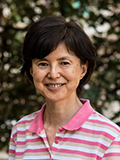Sachiko Amari

Commendation
For pioneering research on presolar grains and noble gases in meteorites and their application to astrophysical phenomena
A list of five representative papers
- Sachiko Amari, Edward Anders, Alois Virag & Ernst Zinner, Nature volume 345, pages 238–240 (1990) Interstellar graphite in meteorites
- Sachiko Amari, Peter Hoppe, Ernst Zinner & Roy S. Lewis, Nature volume 365, pages 806–809 (1993) The isotopic compositions and stellar sources of meteoritic graphite grains
- Sachiko Amari, Xia Gao, Larry R. Nittler, Ernst Zinner, Jordi José, Margarita Hernanz & Roy S. Lewis, The Astrophysical Journal volume 551, pages 1065-1072 (2001) Presolar Grains from Novae
- Sachiko Amari Shiho Zaizen & Jun-Ichi Matsuda, Geochimica et Cosmochimica Acta volume 67, pages 4665-4677 (2003) An attempt to separate Q from the Allende meteorite by physical methods
- Olga Pravdivtseva, François L. H. Tissot, Nicolas Dauphas & Sachiko Amari, Nature Astronomy volume 4, pages 617–624 (2020) Evidence of presolar SiC in the Allende Curious Marie calcium–aluminium-rich inclusion
Major achievements
Dr. Amari developed the world’s first method for isolating small amounts of presolar grains (graphite, SiC, and diamond) in primitive meteorites, and succeeded for the first time in analyzing their isotopic ratios on a grain-by-grain basis. As a result, the following human firsts were achieved: the discovery of pre-solar grains of supernova origin, the discovery of pre-solar grains of nova origin, and proof that various stars produce grains. These and many other outstanding research results have greatly advanced our understanding of the process of nucleosynthesis in stars and the subsequent process of circumstellar dust formation. She also showed that grains rained down from space while sediments were being deposited in the Earth’s deep ocean introduced the characteristic helium isotope ratios of deep-sea sediments. The presolar grains she isolated and purified were supplied to researchers around the world, contributing greatly to the integration and advancement of cosmochemistry and astrophysics.
Nominator
Larry Nittler
